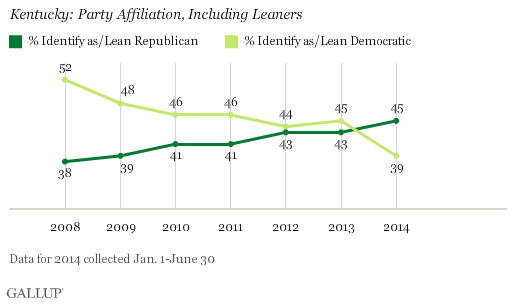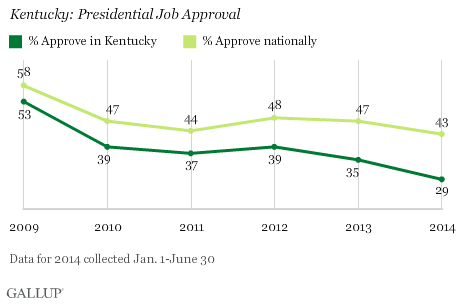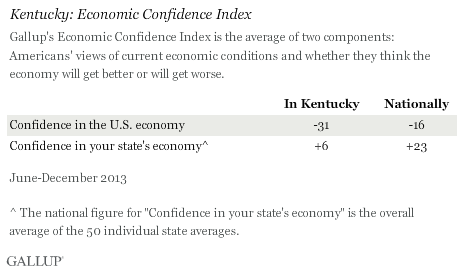WASHINGTON, D.C. -- A series of disheartening figures could make Democratic Kentucky Secretary of State Alison Lundergan Grimes' attempt to unseat Senate Minority Leader Mitch McConnell all the more difficult. Kentuckians are now more likely to identify as or lean toward Republicans (45%) than Democrats (39%). In the prior six years, Gallup found Democrats held at least a slight advantage.

The six-percentage-point edge favoring Republicans, based on interviewing conducted in Kentucky from January through June of this year, underscores the uphill battle Grimes faces in trying to unseat McConnell. And given typical Republican advantages in voter turnout, the Democratic deficit on partisanship among those Kentucky residents who actually turn out to vote may be even greater than six points.
Although the Senate race has been considered a potential Democratic takeover, that possibility now seems a bit more remote after the Democratic Senatorial Campaign Committee announced it will stop running television ads in support of Grimes' bid to defeat the long-serving Republican incumbent.
The shift toward Republican Party affiliation certainly aids McConnell's chances. McConnell narrowly won in 2008, 53% to 47%, in a year when Democrats had a decided advantage in party affiliation both nationally and in Kentucky. That close outcome may have emboldened Democrats to initially invest party resources in an effort to unseat the highest-ranking Republican in the Senate. With 2014 shaping up as a better year for Republicans, a McConnell upset may not be in the cards -- and Democrats' decision to withdraw ads from the state may be an admission of that.
If Democrats are not successful overall in this year's midterm election, McConnell is poised to become Senate majority leader.
Obama's Impact on the Kentucky Race for U.S. Senate
It has been common for Republican candidates throughout the 2014 election season to exploit the unpopularity of Democratic President Barack Obama by linking the president to their Democratic opponents. But as of recently, the Bluegrass State has become the political epicenter of the president's burden on competing Democrats.
Kentucky's 29% job approval rating for Obama in the first six months of this year is one of the lowest in the nation, and is among just a handful of states where approval has dipped below 30%. That compares to a 43% approval rating nationally during the same period. Though the state has typically fallen well below the average in approval of Obama's performance, the difference is larger in 2014 than in any previous year since he took office.

Obama's dire unpopularity in Kentucky has been a vulnerable point for Grimes throughout the race, but has become even more of an issue since she declined in two media appearances to say whether she voted for him in the presidential election. Perhaps these figures shed some light on why Grimes would be reluctant to divulge her vote -- but regardless, the apprehension she expressed has put a spotlight on the president in a race Grimes would likely prefer he not be a part of.
The reality, however, is that Obama and his policies are very much at the center of the race. Kentucky has been one of the shining stars of Obama's Affordable Care Act, and the sharp drop in the state's uninsured rate has been touted as one of the program's greatest successes. This is especially noted given that Kentucky has the highest smoking rate in the country and one of the highest levels of obesity.
In theory, the success of the healthcare law in Kentucky should give Grimes a leg up in the race since McConnell and the GOP have vehemently opposed the act. However, the state's branding of its exchange, Kynect, has allowed Kentuckians to disassociate the program from the president, even if it was his leadership that spearheaded it in the first place.
In Kentucky, Very Low Confidence in the National Economy
Underscoring Kentuckians' decision in November are the dismal views they have of the economy. Kentucky is among the bottom five states when it comes to residents' views of the national economy's current condition and future prospects, based on Gallup's Economic Confidence Index. Kentucky's index score of -31 is 15 points lower than the national average.
Kentuckians were significantly more positive in their views of their state's economy (+6) in a Gallup poll conducted last year, but still lagged behind the 50-state index reading (+23).

Bottom Line
As a candidate taking on a powerful, long-serving incumbent senator, Grimes undoubtedly has a lot going against her.
Though she has taken many opportunities to remind voters that Obama isn't on the ballot with her, Grimes' recent refusal to say whether she voted for the president has put a spotlight on an area she probably would like to avoid, given the president's very low approval rating in her state -- one of the lowest in the nation. At the same time, Kentucky is among the states showing the most positive impact from Obama's healthcare law; however, if residents do connect this directly with the president, it is not apparent in his approval rating.
While Democratic presence in the state has gradually shrunk over the past several years, 2014 saw a sharp drop in the percentage of Kentuckians who identify with or lean toward the party. In some respects, this decline might not mean much, as Republicans have still managed to control five of the state's six congressional seats despite the state having a Democratic edge. And this is likely due to greater average turnout among Republicans to overcome Democrats' numerical advantage in partisanship among all Kentucky adults.
A continued drop in Democratic Party affiliation could mean more damage to the party next year, however, as the state's leading Democrat, Gov. Steve Beshear, is not eligible for re-election due to state term limits. This gives Republicans yet another opening to tighten their grip on Kentucky if they succeed in getting McConnell re-elected.
Survey Methods
Results for this Gallup poll are based on telephone interviews conducted Jan. 1-June 30, 2014, on the Gallup Daily tracking survey, with a random sample of 88,802 adults, aged 18 and older, living in all 50 U.S. states and the District of Columbia. Results are also based on Gallup's recent 50-state poll conducted June-December 2013 with a random sample of approximately 600 adults per state, aged 18 and older, living in all 50 U.S. states.
For results based on the 2014 sample of 1,419 Kentucky residents, the margin of sampling error is ±2 percentage points at the 95% confidence level.
For results based on the 2013 50-state poll, the margin of sampling error is ±5 percentage points at the 95% confidence level.
For both the Gallup Daily tracking poll and the 50-state poll, interviews are conducted with respondents on landline telephones and cellular phones, with interviews conducted in Spanish for respondents who are primarily Spanish-speaking. Landline telephone numbers and cellphone numbers are selected using random-digit-dial methods. Landline respondents are chosen at random within each household on the basis of which member had the most recent birthday. In the Gallup Daily tracking poll, each sample of national adults includes a minimum quota of 50% cellphone respondents and 50% landline respondents, with additional minimum quotas by region. In the 50-state poll, each sample of national adults includes minimum quotas of cellphone respondents and landline respondents based on cellphone and landline use in the respective state. Samples are weighted to correct for unequal selection probability, nonresponse, and double coverage of landline and cell users in the two sampling frames. They are also weighted to match demographics of gender, age, race, Hispanic ethnicity, education, region, population density, and phone status (cellphone only/landline only/both, cellphone mostly, and having an unlisted landline number). Demographic weighting targets are based on the most recent Current Population Survey figures for the aged 18 and older U.S. population. Phone status targets are based on the most recent National Health Interview Survey. Population density targets are based on the most recent U.S. census. All reported margins of sampling error include the computed design effects for weighting.
In addition to sampling error, question wording and practical difficulties in conducting surveys can introduce error or bias into the findings of public opinion polls.
For more details on Gallup's polling methodology, visit www.gallup.com.

